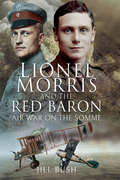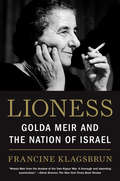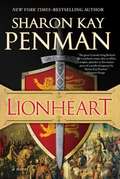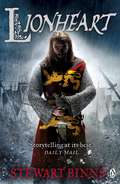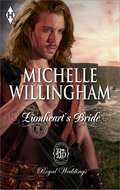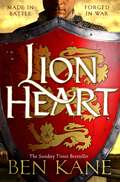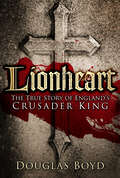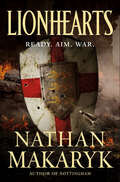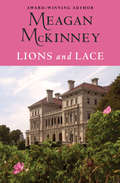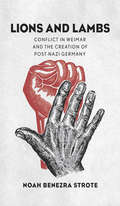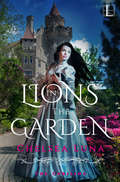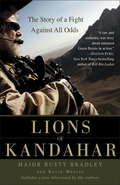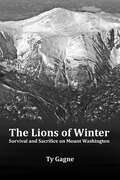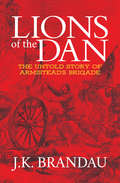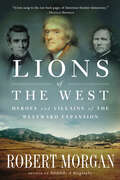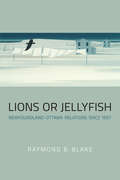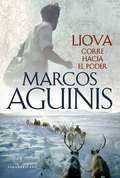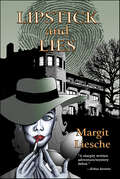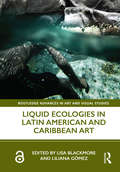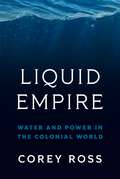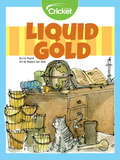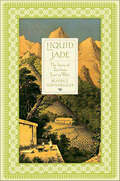- Table View
- List View
Lionel Morris and the Red Baron: Air War on the Somme
by Jill BushA biography of the young, London-born, World War I pilot who was the first to be shot down by the legendary Red Baron. Nineteen-year-old Lionel Morris left the infantry for the wood and wires of the Royal Flying Corps on the Western Front in 1916, joining one of the world&’s first fighter units alongside the great ace Albert Ball. Learning on the job, in dangerously unpredictable machines, Morris came of age as a combat pilot on the first day of the Battle of the Somme, as the R.F.C. was winning a bloody struggle for admiralty of the air. As summer faded to autumn and the skies over Bapaume filled with increasing numbers of enemy aircraft, the tide turned. On 17 September 1916, Morris&’s squadron was attacked by a lethally efficient German unit, including an unknown pilot called Manfred von Richthofen. As the shock waves spread from the empty hangars of No.11 Squadron all the way to the very top of the British Army, the circumstances surrounding Morris&’s death marked a pivotal shift in the aerial war, and the birth of its greatest legend. Told through previously unpublished archive material, the words of contemporaries, and official records, Lionel Morris and the Red Baron traces a short but extraordinary life and reveals how Morris&’s role in history was rediscovered one hundred years after his death. Praise for Lionel Morris and the Red Baron &“The best written World War I aviation history account this reviewer has read in some time . . . has earned the highest recommendation.&” —Over the Front &“This is a book that deserves to be read.&” —The Aviation Historian
Lionel Robbins
by Susan HowsonBy the time of his death the English economist Lionel Robbins (1898-1984) was celebrated as a 'renaissance man'. He made major contributions to his own academic discipline and applied his skills as an economist not only to practical problems of economic policy - with conspicuous success when he served as head of the economists advising the wartime coalition government of Winston Churchill in 1940-45 - and of higher education - the 'Robbins Report' of 1963 - but also to the administration of the visual and performing arts that he loved deeply. He was devoted to the London School of Economics, from his time as an undergraduate following active service as an artillery officer on the Western Front in 1917-18, through his years as Professor of Economics (1929-62), and his stint as chairman of the governors during the 'troubles' of the late 1960s. This comprehensive biography, based on his personal and professional correspondence and other papers, covers all these many and varied activities.
Lioness: Golda Meir and the Nation of Israel
by Francine KlagsbrunThe definitive biography of the iron-willed leader, chain-smoking political operative, and tea-and-cake-serving grandmother who became the fourth prime minister of Israel Golda Meir was a world figure unlike any other. Born in tsarist Russia in 1898, she immigrated to America in 1906 and grew up in Milwaukee, where from her earliest years she displayed the political consciousness and organizational skills that would eventually catapult her into the inner circles of Israel's founding generation. Moving to mandatory Palestine in 1921 with her husband, the passionate socialist joined a kibbutz but soon left and was hired at a public works office by the man who would become the great love of her life. A series of public service jobs brought her to the attention of David Ben-Gurion, and her political career took off. Fund-raising in America in 1948, secretly meeting in Amman with King Abdullah right before Israel's declaration of independence, mobbed by thousands of Jews in a Moscow synagogue in 1948 as Israel's first representative to the USSR, serving as minister of labor and foreign minister in the 1950s and 1960s, Golda brought fiery oratory, plainspoken appeals, and shrewd deal-making to the cause to which she had dedicated her life—the welfare and security of the State of Israel and its inhabitants. As prime minister, Golda negotiated arms agreements with Richard Nixon and Henry Kissinger and had dozens of clandestine meetings with Jordan's King Hussein in the unsuccessful pursuit of a land-for-peace agreement with Israel's neighbors. But her time in office ended in tragedy, when Israel was caught off guard by Egypt and Syria's surprise attack on Yom Kippur in 1973. Analyzing newly available documents from Israeli government archives, Francine Klagsbrun looks into whether Golda could have prevented that war and whether in its darkest days she contemplated using nuclear force. Resigning in the war's aftermath, she spent her final years keeping a hand in national affairs and bemusedly enjoying international acclaim. Klagsbrun's superbly researched and masterly recounted story of Israel's founding mother gives us a Golda for the ages.
Lionheart (The Henry II Trilogy #4)
by Sharon Kay PenmanFrom the New York Times-bestselling novelist, a stunning story of a great medieval warrior-king, the accomplished and controversial son of Henry II and Eleanor of Aquitaine: Richard, Coeur de Lion. They were called "The Devil's Brood," though never to their faces. They were the four surviving sons of Henry Plantagenet and Eleanor of Aquitaine. With two such extraordinary parents, much was expected of them.But the eldest-charming yet mercurial-would turn on his father and, like his brother Geoffrey, meet an early death. When Henry died, Richard would take the throne and, almost immediately, set off for the Holy Land. This was the Third Crusade, and it would be characterized by internecine warfare among the Christians and extraordinary campaigns against the Saracens. And, back in England, by the conniving of Richard's youngest brother, John, to steal his crown.In Lionheart, Sharon Kay Penman displays her remarkable mastery of historical detail and her acute understanding of human foibles. The result is a powerful story of intrigue, war, and- surprisingly-effective diplomacy, played out against the roiling conflicts of love and loyalty, passion and treachery, all set against the rich textures of the Holy Land.
Lionheart (The Making of England Quartet #4)
by Stewart BinnsLionheart is the latest historical adventure novel from Stewart Binns, covering the extraordinary life of King Richard the Lionheart.Richard of Aquitaine, the third son of King Henry II, is developing a fearsome reputation for being a ruthless warrior. Arrogant and conceited he earns the name Richard Lionheart for his bravery and brutality on the battlefield. After the death his brothers, Richard's impatience to take the throne, and gain the immense power that being King over a vast empire would bring him, leads him to form an alliance with Philip II, King of France. After invading his father's lands on the Continent, Richard Lionheart goes on to defeat the King's army at the tumultuous Battle of Ballans. Taking his place on the throne he begins his bloody quest to return the Holy Land to Christian rule.Stewart Binns' Making of England series features Conquest, Crusade, Anarchy and his latest historical page-turner, Lionheart.Praise for Stewart Binns:'A fascinating mix of fact, legend and fiction ... this is storytelling at its best.' Daily Mail 'Stewart Binns has produced a real page-turner, a truly stunning adventure story - Alastair CampbellStewart Binns began his professional life as an academic. He then pursued several adventures, including a stint at the BBC, before settling into a career as a schoolteacher, specializing in history. Later in life, a lucky break took him back to the BBC, which was the beginning of a successful career in television. He has won a BAFTA, a Grierson, an RTS and a Peabody for his documentaries. Stewart's passion is English history, especially its origins and folklore. His previous novels Conquest, Crusade and Anarchy published to great acclaim.
Lionheart's Bride
by Michelle WillinghamKing Richard and Princess Berengaria, 1191Princess Berengaria's lady-in-waiting, Adriana, takes her duty to the future Queen of England seriously-she will defend her to the death! When their sea voyage to the Holy Land ends up in shipwreck and capture Adriana knows her only hope lies with the mysterious Irishman, Liam MacEgan. Liam escapes to reach Richard the Lionheart and together they plan a rescue mission. Nothing will stop these warriors from succeeding-their future brides are captive on Cyprus and they'll raise hell to claim them!
Lionheart: A rip-roaring epic novel of one of history’s greatest warriors by the Sunday Times bestselling author
by Ben KaneREBEL. LEADER. BROTHER. KING.1179. Henry II is King of England, Wales, Ireland, Normandy, Brittany and Aquitaine. The House of Plantagenet reigns supreme.But there is unrest in Henry's house. Not for the first time, his family talks of rebellion.Ferdia - an Irish nobleman taken captive during the conquest of his homeland - saves the life of Richard, the king's son. In reward for his bravery, he is made squire to Richard, who is already a renowned warrior.Crossing the English Channel, the two are plunged into a campaign to crush rebels in Aquitaine. The bloody battles and gruelling sieges which followed would earn Richard the legendary name of Lionheart.But Richard's older brother, Henry, is infuriated by his sibling's newfound fame. Soon it becomes clear that the biggest threat to Richard's life may not be rebel or French armies, but his own family...'A rip-roaring epic, filled with arrows and spattered with blood. Gird yourself with mail when you start.' Paul Finch'Ben's deeply authoritative depiction of the time is delivered in a deft manner.' Simon Scarrow
Lionheart: The True Story of England's Crusader King
by Douglas BoydWhen people think of Richard the Lionheart they recall the scene at the end of every Robin Hood epic when he returns from the Crusades to punish his treacherous brother John and the wicked Sheriff of Nottingham. In reality Richard detested England and the English, was deeply troubled by his own sexuality and was noted for greed, not generosity, and for murder rather than mercy. In youth Richard showed no interest in girls; instead, a taste for cruelty and a rapacity for gold that would literally be the death of him. To save his own skin, he repeatedly abandoned his supporters to an evil fate, and his indifference to women saw the part of queen at his coronation played by his formidable mother, Queen Eleanor. His brief reign bankrupted England twice, destabilised the powerful empire his parents had put together and set the scene for his brother’s ruinous rule. So how has Richard come to be known as the noble Christian warrior associated with such bravery and patriotism? Lionheart reveals the scandalous truth about England’s hero king – a truth that is far different from the legend that has endured for eight centuries.
Lionheart: The perfect gift for Father’s Day
by Ben KaneREBEL. LEADER. BROTHER. KING.1179. Henry II is King of England, Wales, Ireland, Normandy, Brittany and Aquitaine. The House of Plantagenet reigns supreme.But there is unrest in Henry's house. Not for the first time, his family talks of rebellion.Ferdia - an Irish nobleman taken captive during the conquest of his homeland - saves the life of Richard, the king's son. In reward for his bravery, he is made squire to Richard, who is already a renowned warrior.Crossing the English Channel, the two are plunged into a campaign to crush rebels in Aquitaine. The bloody battles and gruelling sieges which followed would earn Richard the legendary name of Lionheart.But Richard's older brother, Henry, is infuriated by his sibling's newfound fame. Soon it becomes clear that the biggest threat to Richard's life may not be rebel or French armies, but his own family...'A rip-roaring epic, filled with arrows and spattered with blood. Gird yourself with mail when you start.' Paul Finch'Ben's deeply authoritative depiction of the time is delivered in a deft manner.' Simon Scarrow
Lionhearts (Nottingham #2)
by Nathan MakarykHistory and myth collide in Nathan Makaryk's Lionhearts, a riveting story of vengeance, redemption and war, perfect for fans of Game of Thrones.All will be well when King Richard returns . . . but King Richard has been captured. To raise the money for his ransom, every lord in England is raising taxes, the French are eyeing the empty throne, and the man they called, “Robin Hood,” the man the Sherriff claims is dead, is everywhere and nowhere at once.He’s with a band of outlaws in Sherwood Forest, raiding guard outposts. He’s with Nottingham’s largest gang, committing crimes to protest the taxes. He’s in the lowest slums of the city, conducting a reign of terror against the city's most vulnerable. A hero to some, a monster to others, and an idea that can't simply be killed.But who's really under the hood?At the Publisher's request, this title is being sold without Digital Rights Management Software (DRM) applied.
Lions and Lace (Van Alen Sisters #1)
by Meagan McKinneyFrom the glittering mansions of the Astors and the Vanderbilts to the gas-lit streets of New York, this passionate novel by award-winning author Meagan McKinney brings together a desperate woman and a handsome stranger who could expose her scandalous secret New York heiress Alana Van Alen has everything—beauty, wealth, and status. But she is living a lie. To protect her sister, she plays society&’s game and attends dazzling balls and soirees—until a cunningly orchestrated act of revenge leaves her penniless and at the mercy of one of the city&’s most notorious gentlemen. Dubbed the Predator of Wall Street, Trevor Sheridan rose from abject poverty in Ireland to the pinnacle of power in Manhattan. Yet he&’s still shunned by the city&’s elite Four Hundred. Now he has parlayed his hunger for revenge into a scheme to destroy the rich and powerful. In the final phase of his plan, he will marry the pedigreed Alana Van Alen to gain the acceptance that has been denied to him for so long. But along the way, he makes a fatal misstep: He falls in love with her. The romantic saga of the Van Alen sisters continues with Christal Van Alen&’s story in Fair Is the Rose.
Lions and Lambs: Conflict in Weimar and the Creation of Post-Nazi Germany
by Noah Benezra StroteA bold new interpretation of Germany’s democratic transformation in the twentieth century, focusing on the generation that shaped the post-Nazi reconstruction Not long after the horrors of World War II and the Holocaust, Germans rebuilt their shattered country and emerged as one of the leading nations of the Western liberal world. In his debut work, Noah Strote analyzes this remarkable turnaround and challenges the widely held perception that the Western Allies—particularly the United States—were responsible for Germany’s transformation. Instead, Strote draws from never-before-seen material to show how common opposition to Adolf Hitler united the fractious groups that had once vied for supremacy under the Weimar Republic, Germany’s first democracy (1918-1933). His character-driven narrative follows ten Germans of rival worldviews who experienced the breakdown of Weimar society, lived under the Nazi dictatorship, and together assumed founding roles in the democratic reconstruction. While many have imagined postwar Germany as the product of foreign-led democratization, this study highlights the crucial role of indigenous ideas and institutions that stretched back decades before Hitler. Foregrounding the resolution of key conflicts that crippled the country’s first democracy, Strote presents a new model for understanding the origins of today’s Federal Republic.
Lions in the Garden (The Uprising #1)
by Chelsea LunaPrague, 1610Ludmila Novakova--Mila--has barely set foot outside Prague Castle in her seventeen years. But with the choice between braving the bandits and wolves of Bohemia's uneasy roads or being married off to a disgusting old baron, she's taken what she can carry and fled. Escape won't be easy. Even Mila has heard the rumors of a rebellion coming against the court. The peasants are hungry. The king hasn't been seen in months. Mila's father, the High Chancellor, is well known and well hated. But Mila can't sit behind a stone wall and let fear force her into a life of silk gowns and certain misery. Her mother's death has taught her that much. She has one ally: Marc, the son of the blacksmith. A commoner, a Protestant--and perhaps a traitor, too. But the farther she gets from the castle, the more lies she uncovers, unraveling everything she thought she knew. And the harder it is to tell friend from enemy--and wrong from right . . .
Lions of Kandahar: The Story of a Fight Against All Odds
by Rusty Bradley Kevin MaurerOne of the most critical battles of the Afghan War is now revealed as never before. Lions of Kandahar is an inside account from the unique perspective of an active-duty U.S. Army Special Forces commander, an unparalled warrior with multiple deployments to the theater who has only recently returned from combat there.Southern Afghanistan was slipping away. That was clear to then-Captain Rusty Bradley as he began his third tour of duty there in 2006. The Taliban and their allies were infiltrating everywhere, poised to reclaim Kandahar Province, their strategically vital onetime capital. To stop them, the NATO coalition launched Operation Medusa, the largest offensive in its history. The battlefield was the Panjwayi Valley, a densely packed warren of walled compounds that doubled neatly as enemy bunkers, lush orchards, and towering marijuana stands, all laced with treacherous irrigation ditches. A mass exodus of civilians heralded the carnage to come.Dispatched as a diversionary force in support of the main coalition attack, Bradley's Special Forces A-team and two others, along with their longtime Afghan Army allies, watched from across the valley as the NATO force was quickly engulfed in a vicious counterattack. Key to relieving it and calling in effective air strikes was possession of a modest patch of high ground called Sperwan Ghar. Bradley's small detachment assaulted the hill and, in the midst of a savage and unforgettable firefight, soon learned they were facing nearly a thousand seasoned fighters--from whom they seized an impossible victory.Now Bradley recounts the whole remarkable story as it actually happened. The blistering trek across Afghanistan's infamous Red Desert. The eerie traces of the elusive Taliban. The close relations with the Afghan people and army, a primary mission focus. Sperwan Ghar itself: unremitting waves of fire from machine guns and rocket-propelled grenades; a targeted truck turned into an inferno; the death trap of a cut-off compound. Most important: the men, Americans and Afghans alike--the "shaky" medic with nerves of steel and a surgeon's hands in battle; the tireless sergeant who seems to be everywhere at once; the soft-spoken intelligence officer with laser-sharp insight; the diminutive Afghan commander with a Goliath-sized heart; the cool maverick who risks all to rescue a grievously wounded comrade--each unique, all indelible in their everyday exercise of extraordinary heroism.From the Hardcover edition.
Lions of Winter: Survival and Sacrifice on Mount Washington
by Ty GagneOn January 25, 1982, during a four-day search for two missing ice climbers on New Hampshire's Mt.t Washington in extreme weather conditions, Albert Dow, a member of the all-volunteer Mountain Rescue Service, became the first-and so far the only- member of a backcountry search and rescue team to be killed in the line of duty in the White Mountains. He was caught in an avalanche in terrain previously thought to present no risk. His teammate, Michael Hartrich, was injured in the accident. <P><P> In The Lions of Winter, author Ty Gagne describes the ordeal of the missing climbers, the selflessness and courage of the dedicated rescuers, the tragic circumstances surrounding the avalanche, and the heartbreak of the family, friends, and teammates of the fallen rescuer. Gagne also chronicles how this grueling event became a landmark of White Mountain history, ushering in a new era in the search and rescue community of New Hampshire. <P><P> In what is by far his longest and most in-depth book yet, The Lions of Winter, author Ty Gagne describes the ordeal of the missing climbers, the selflessness and courage of the dedicated rescuers, the tragic circumstances surrounding the avalanche, and the heartbreak of the family, friends, and teammates of the fallen rescuer.
Lions of the Dan: The Untold Story of Armistead's Brigade
by J.K. Brandau&“Tells the brigade&’s long history for the first time . . . captures the daily grind of soldiers striving and struggling in the ranks . . . A triumph&” (Peter S. Carmichael, Robert C. Fluhrer Professor of Civil War Studies and Director of the Civil War Institute, Gettysburg College). This unique history chronicles those men of Pickett&’s Charge over the full course of the Civil War. While time-honored celebrations of Armistead and Pickett focus narrowly on moments at Gettysburg, primary sources declare the untold story of the best of men in the worst of times, and refutes Lost Cause myths surrounding Armistead and Pickett. For the first time, Lions of the Dan widens the aperture to introduce real heroes and amazing deeds that have been suppressed until now. The author presents the experiences of real soldiers in their own words and highlights the much-ignored history of Southside Virginia, presenting the Civil War start to finish from a unique regional perspective. Readers will find their pedestrian notions of the founding of the South&’s peculiar institution challenged as they read an objective account of Virginia&’s secession and celebrate the courage and devotion of soldiers on both sides.
Lions of the West: Heroes and Villains of the Westward Expansion
by Robert MorganFrom Thomas Jefferson’s birth in 1743 to the California Gold Rush in 1849, America’s westward expansion comes to life in the hands of a writer fascinated by the way individual lives link up, illuminate one another, and collectively impact history. Jefferson, a naturalist and visionary, dreamed that the United States would stretch across the North American continent, from ocean to ocean. The account of how that dream became reality unfolds in the stories of Jefferson and nine other Americans whose adventurous spirits and lust for land pushed the westward boundaries: Andrew Jackson, John “Johnny Appleseed” Chapman, David Crockett, Sam Houston, James K. Polk, Winfield Scott, Kit Carson, Nicholas Trist, and John Quincy Adams. Their stories—and those of the nameless thousands who risked their lives to settle on the frontier, displacing thou- sands of Native Americans—form an extraordinary chapter in American history that led directly to the cataclysm of the Civil War. Filled with illustrations, portraits, maps, battle plans, notes, and time lines, Lions of the West is a richly authoritative biography of America—its ideals, its promise, its romance, and its destiny.
Lions or Jellyfish
by Raymond B. BlakeAsked in 2010 about his pugnacious approach to federal-provincial relations, Newfoundland premier Danny Williams declared "I would rather live one more day as a lion than ten years a jellyfish." He was only the latest in a long line of Newfoundland premiers who have fought for that province's interests on the national stage. From Joey Smallwood and the conflict over Term 29 of the Act of Union to Williams and his much-publicized clashes with Paul Martin and Stephen Harper, Newfoundland and Labrador's politicians have often expressed a determination to move beyond a legacy of colonialism and assert greater control over the province's own affairs.Lions or Jellyfish? examines the history of these federal-provincial clashes with both clarity and wit. Written by a noted expert on Newfoundland politics and intergovernmental affairs in Canada, this book studies a vital but frequently overlooked aspect of modern Canadian federalism.
Liova: Corre hacia el poder
by Marcos AguinisAguinis nos introduce en una historia fascinante, los entresijos, los claroscuros de un momento único cuya cima es la revolución bolchevique, hito mayor del comunismo. El creador del Ejército Rojo, el líder -con Lenin- de la Revolución Rusa de octubre de 1917, el intelectual que generó la idea de la "revolución permanente", ese es el protagonista de esta nueva obra de Marcos Aguinis. Es el mismo León Trotsky, en su infancia y juventud, el que le permite al autor una proeza literaria: una novela de iniciación que sigue las huellas de una transformación apasionada y que culmina en la construcción de un personaje clave, que cambió la historia del siglo XX. Con naturalidad, el texto se aferra a los oscilantes destellos ideológicos del protagonista y sus circunstancias, pero su trabajo mayor, su delicada orfebrería, es la de descubrir la esencia del hombre por sobre todas las cosas; un hombre con sueños que se pueden trocar en realidad. La acción de Liova (como llamaban a Trotsky de pequeño) nos lleva desde la infancia hasta la cumbre, pasando por los primeros escritos en Odesa, los destierros en Siberia, las fugas por la estepa llena de lobos, su formación a través de media Europa, los amores encontrados y los perdidos, las contradicciones, la familia, las traiciones, los grandes nombres (Máximo Gorki, Lenin, Rosa Luxemburgo) y los gestos de una domesticidad que desarma. Esta novela, provista de una intensidad asombrosa, arroja nueva luz sobre el personaje pero se lee «virtud de todas las narraciones cinceladas por Marcos Aguinis» como un vibrante relato de aventuras.
Lipstick Traces
by Greil MarcusGreil Marcus, author of Mystery Train, widely acclaimed as the best book ever written about America as seen through its music, began work on this new book out of a fascination with the Sex Pistols: that scandalous antimusical group, invented in London in 1975 and dead within two years, which sparked the emergence of the culture called punk. âeoeI am an antichrist!âe#157; shouted singer Johnny Rottenâe"where in the world of pop music did that come from? Looking for an answer, with a high sense of the drama of the journey, Marcus takes us down the dark paths of counterhistory, a route of blasphemy, adventure, and surprise. This is no mere search for cultural antecedents. Instead, what Marcus so brilliantly shows is that various kinds of angry, absolute demandsâe"demands on society, art, and all the governing structures of everyday lifeâe"seem to be coded in phrases, images, and actions passed on invisibly, but inevitably, by people quite unaware of each other. Marcus lets us hear strange yet familiar voices: of such heretics as the Brethren of the Free Spirit in medieval Europe and the Ranters in seventeenth-century England; the dadaists in Zurich in 1916 and Berlin in 1918, wearing death masks, chanting glossolalia; one Michel Mourre, who in 1950 took over Easter Mass at Notre-Dame to proclaim the death of God; the Lettrist International and the Situationist International, small groups of Parisâe"based artists and writers surrounding Guy Debord, who produced blank-screen films, prophetic graffiti, and perhaps the most provocative social criticism of the 1950s and âe(tm)60s; the rioting students and workers of May âe(tm)68, scrawling cryptic slogans on city walls and bringing France to a halt; the Sex Pistols in London, recording the savage âeoeAnarchy in the U. K. âe#157; and âeoeGod Save the Queen. âe#157;Although the Sex Pistols shape the beginning and the end of the story, Lipstick Traces is not a book about music; it is about a common voice, discovered and transmitted in many forms. Working from scores of previously unexamined and untranslated essays, manifestos, and filmscripts, from old photographs, dada sound poetry, punk songs, collages, and classic texts from Marx to Henri Lefebvre, Marcus takes us deep behind the acknowledged events of our era, into a hidden tradition of moments that would seem imaginary except for the fact that they are real: a tradition of shared utopias, solitary refusals, impossible demands, and unexplained disappearances. Written with grace and force, humor and an insistent sense of tragedy and danger, Lipstick Traces tells a story as disruptive and compelling as the century itself.
Lipstick and Lies: A Pucci Lewis Mystery (Pucci Lewis Mysteries #0)
by Margit Liesche"A sharply written adventure/mystery debut." —Kirkus ReviewsWomen Air Force Service Pilot and undercover agent Pucci Lewis did not want to go to jail. But how else could she unmask Grace Buchanan-Dineen, an imprisoned countess/counteragent suspected of triple-dealing and possibly putting the country's future at risk?Buchanan-Dineen was a real-life figure who led a German spy ring operating in Detroit during WWII. Confronted by the FBI, she agreed to act as a counteragent helping to nail the other ring members. Jailed along with her cohorts—"for her own protection"—her rancor ran deep.Enter Pucci, landing in a B-24 bomber at the Willow Run aircraft factory. Late for a meeting, she takes a shortcut and stumbles upon a corpse. Agent Dante appears, revealing the dead man to be a German spy. A fellow Willow Run employee, Otto Renner, had been under surveillance and the FBI suspects a link between Renner and the imprisoned countess. Dante convinces Pucci to become a sister inmate to see what she can learn. Then she infiltrates a posh women's club where Buchanan-Dineen once lectured as a "charm consultant." Could the club be the center of a spy ring?
Liquid Ecologies in Latin American and Caribbean Art (Routledge Advances in Art and Visual Studies)
by Liliana Gómez Lisa BlackmoreThis interdisciplinary book brings into dialogue research on how different fluids and bodies of water are mobilised as liquid ecologies in the arts in Latin America and the Caribbean. Examining the visual arts, including multimedia installations, performance, photography and film, the chapters place diverse fluids and systems of flow in art historical, ecocritical and cultural analytical contexts. The book will be of interest to scholars of art history, cultural studies, environmental humanities, blue humanities, ecocriticism, Latin American and Caribbean studies, and island studies.
Liquid Empire: Water and Power in the Colonial World
by Corey RossA bold new account of European imperialism told through the history of waterIn the nineteenth and twentieth centuries, a handful of powerful European states controlled more than a third of the land surface of the planet. These sprawling empires encompassed not only rainforests, deserts, and savannahs but also some of the world&’s most magnificent rivers, lakes, marshes, and seas. Liquid Empire tells the story of how the waters of the colonial world shaped the history of imperialism, and how this imperial past still haunts us today.Spanning the major European empires of the period, Corey Ross describes how new ideas, technologies, and institutions transformed human engagements with water and how the natural world was reshaped in the process. Water was a realm of imperial power whose control and distribution were closely bound up with colonial hierarchies and inequalities—but this vital natural resource could never be fully tamed. Ross vividly portrays the efforts of officials, engineers, fisherfolk, and farmers to exploit water, and highlights its crucial role in the making and unmaking of the colonial order.Revealing how the legacies of empire have persisted long after colonialism ebbed away, Liquid Empire provides needed historical perspective on the crises engulfing the world&’s waters, particularly in the Global South, where billions of people are faced with mounting water shortages, rising flood risks, and the relentless depletion of sea life.
Liquid Gold
by Liz HuyckWhat would you give for a bucket of pee? You might be surprised—pee is full of useful stuff! It’s had a lot of uses throughout history. See how people have used urine for important aspects of life— including cleaning your clothes and brushing your teeth!
Liquid Jade: The Story of Tea from East to West
by Beatrice HoheneggerTraveling from East to West over thousands of years, tea has played a variety of roles on the world scene – in medicine, politics, the arts, culture, and religion. Behind this most serene of beverages, idolized by poets and revered in spiritual practices, lie stories of treachery, violence, smuggling, drug trade, international espionage, slavery, and revolution. Liquid Jade's rich narrative history explores tea in all its social and cultural aspects. Entertaining yet informative and extensively researched, Liquid Jade tells the story of western greed and eastern bliss. China first used tea as a remedy. Taoists celebrated tea as the elixir of immortality. Buddhist Japan developed a whole body of practices around tea as a spiritual path. Then came the traumatic encounter of the refined Eastern cultures with the first Western merchants, the trade wars, the emergence of the ubiquitous English East India Company. Scottish spies crisscrossed China to steal the secrets of tea production. An army of smugglers made fortunes with tea deliveries in the dead of night. In the name of "free trade" the English imported opium to China in exchange for tea. The exploding tea industry in the eighteenth century reinforced the practice of slavery in the sugar plantations. And one of the reasons why tea became popular in the first place is that it helped sober up the English, who were virtually drowning in alcohol. During the nineteenth century, the massive consumption of tea in England also led to the development of the large tea plantation system in colonial India – a story of success for British Empire tea and of untold misery for generations of tea workers.Liquid Jade also depicts tea's beauty and delights, not only with myths about the beginnings of tea or the lovers' legend in the familiar blue-and-white porcelain willow pattern, but also with a rich and varied selection of works of art and historical photographs, which form a rare and comprehensive visual tea record. The book includes engaging and lesser-known topics, including the exclusion of women from seventeenth-century tea houses or the importance of water for tea, and answers such questions as: "What does a tea taster do?" "How much caffeine is there in tea?" "What is fair trade tea?" and "What is the difference between black, red, yellow, green, or white tea?" Connecting past and present and spanning five thousand years, Beatrice Hohenegger's captivating and multilayered account of tea will enhance the experience of a steaming "cuppa" for tea lovers the world over.
